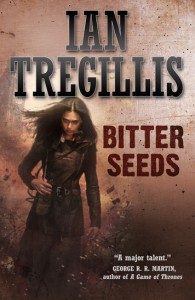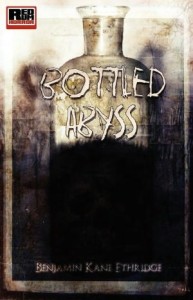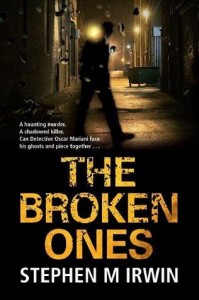 Title: Bitter Seeds – Book One of the Milkweed Triptych
Title: Bitter Seeds – Book One of the Milkweed Triptych
Author: Ian Tregillis
Publisher: TOR (US) / Orbit (AUS/UK)
Author: Ian Tregillis lives near Santa Fe, New Mexico, where he works as a physicist at Los Alamos Laboratory. He is a member of the George R.R. Martin Wild Cards writing collective. ‘Bitter Seeds’ is his first novel.
Blurb:
It’s 1939. The Nazis have supermen, the British have demons, and one perfectly normal man is caught in between.
Bitter Seeds is the first novel from US author, Ian Tregillis, and it contains all the ingredients to make any dark-fantasy, horror, spec-fic or alternate/secret history fan salivate with anticipation. The novel contains not just Nazis, but scientifically enhanced Super-Nazis with strange powers! Mad scientists. Bookish British warlocks conjuring demonic entities. Kick-ass British soldiers on secret missions into the heart of enemy territory. It’s all there, on the cover and in the blurb, just inviting you to dive into its pages. The big question is, does it all work? Does the content satisfy such an exciting premise?
Raybould Marsh is a British secret agent on a mission in the final years of the Spanish Civil War. When his informant, with important information on Germany’s preparations for all out War in Europe, spontaneously combusts Marsh finds his cover almost blown and must escape back to England. He thinks that is the end of his mission, but really, it is just the beginning of something much bigger. It’s the strange lady he sees down on the docks, with what appears to be wires coming out of her head and a look and a wink that seems to say she knows, him that sticks in his mind.
Back in London, Germany has invaded Poland, and the British Government is preparing for war. The Nazi war-machine ploughs through western Europe with astonishing speed, much faster than intelligence would suggest, and faster than you can goose-step they’re breaching the borders of France. It is agent Raybould Marsh who discovers the Nazi secret – a secret linked to the mysterious woman with the wires in her head – that the Germans have a developed the ability to turn certain individuals into Übermensch; men and women with amazing super powers that allow them to stay one step ahead of the Allies at all times.
Faced with the prospect of defeat at the hands of such an unnatural onslaught, the British resort to their own unnatural (nay, supernatural) defense… the creation of a secret organisation known as Milkweed, and the hiring of Warlocks capable of negotiating with Demons in order to defeat the oncoming Nazi menace.
It is against this backdrop that Tregillis weaves his tale through the viewpoint of four major characters: Marsh, the British ‘every-man’ soldier and spy; Marsh’s friend, dilettante and amateur occultist, Lord William Beauclerk; and the German twins Klaus and Gretel, both of whom have been ‘recruited’ since childhood into the Nazi’s secret Gotterelektrongruppe.
There is a lot in Bitter Seeds that Tregillis does well. The powers possessed by the Nazi super-humans are, if not wholely original, treated in a very interesting way. Prescience, invisibility and the manipulation of matter are just a few of the tricks they can accomplish. So too is the fact that the magick practiced by the Warlocks is not straight forward in a Harry Potter ‘just say the words and wave your wand’ fashion. There are real consequences to dealing with Demons; consequences that effect not only the Warlocks, but everyone around them, in horrendous ways.
The writing though is, unfortunately, uneven. The action scenes are especially well written, but prone to falling into unwelcome info-dumps at the most inopportune times. Many of the characters – especially that of Raybould Marsh – seem two-dimensional, and the most interesting character (Gretel, the Nazi super-human who can see the future) often seems to be little more than a walking deus-ex-machina for the author’s plot twists. The troubled amateur occultist, Will Beauclerk, is probably the most well rounded (and most likeable) of the characters while others seem almost comic-bookish in their actions.
Overall, Bitter Seeds comes across as very well researched. It is easy to get a feel for the time and the place, and there is a real sense of urgency to the threat of winning or losing the war. One area that did annoy me greatly though, is the use of ‘Enochian’ as the magick of choice for the British Warlocks. Despite the great amount of information available on this particular magical discipline, Tregillis appears to have either ignored it or not bothered with his research. Maybe something like this will only bother someone like me – someone who spent over 10 years studying and practicing within the Western Magical Tradition – but what Tregillis describes as ‘Enochian’ magick in Bitter Seeds bears no resemblance to the system crafted by the famous 16th Century English magician Doctor John Dee and his seer Edward Kelley. The system Tregillis describes works very well within the context of the novel – and the idea of ‘negotiating’ with Demons and the ‘blood price’ that must be paid for such congress is great! – but if you’re going to co-opt the name of an existing system you should use something resembling that system or call it something else.
This is a nit-pick though, and many readers will neither know nor care about the methods and intricacies Enochian magic.
Now, it might seem from some of the above that I didn’t like Bitter Seeds. That I wouldn’t recommend it to other readers. This is not so at all! For a first novel, Bitter Seeds is generally a ripping read with some first rate ideas. It isn’t a bad novel… just an uneven one. But in the end, the good out-weighs the bad. I mean, Nazis with scientific super powers versus British Warlocks conjuring almost Lovecraftian demons… what’s not to love about that?



